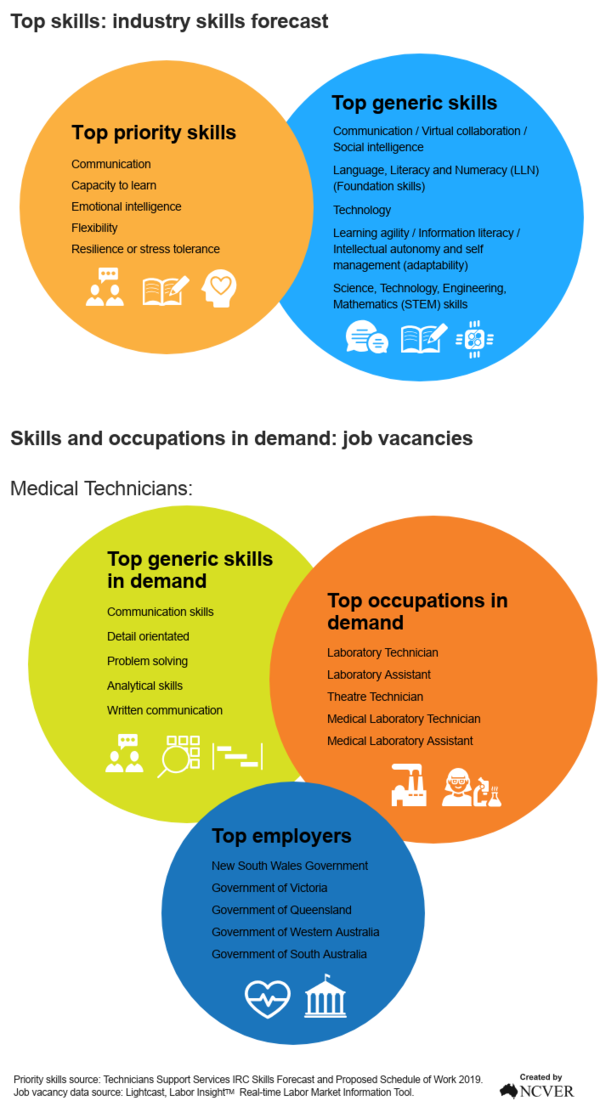
Industry insights on skills needs
The Technicians Support Services IRC's Skills Forecast – 2020 update (hereafter 2020 Annual Update) was the most recent industry skills forecast published by the IRC, as at September 2022. It identified the top five short-to-medium term skills considered important across the workforce supported by the Technicians Support Services Training Package as communication, capacity to learn, emotional intelligence, flexibility, and resilience or stress tolerance.
According to the Medical Technicians job vacancy data, the top requested skills by employers were communication skills and detail orientated. The most advertised positions were Laboratory Technician, followed by Laboratory Assistant. The top employers were the New South Wales Government and the Government of Victoria.
The 2020 Annual Update reported that the wide range of health care and social assistance roles across the sector were impacted by COVID-19 in different ways (further information below). The other main challenges Technicians Support Services workforce face were advances in technology, access to skilled workers with practical experience and a lack of career progression.
Advances in technology
The 2020 Annual Update reported new technology was being continually introduced into practice, which required the ability to learn, operate new equipment and adopt new procedures. In the health sector, there was increased emphasis on the quality of service and customer experience, and alongside this, technology could help reduce the invasiveness of various procedures. The introduction of new technologies also impacts the equipment used in health assessments, health administration as well as the devices people use to monitor their own health. As such, digital skills and knowledge were becoming increasingly important for job roles with the technicians support services sector.
The Pharmacy Forecast Australia 2022 stated that 60% of survey respondents assessed that more formalised training in related technology field as somewhat or very likely to occur by 2021, and recommended that the workforce upskilling in technology.
Staff shortages
Some employers reported they were experiencing difficulties in hiring skilled staff due to a shortage of skilled workers, limited applicants, a lack of existing workers with appropriate skills and an unwillingness to work nights, weekends or shifts. Evidence of shortages of certain skilled workers, such as anaesthetic technician, cardiac technician and medical laboratory technician, could be seen at the time in the listing of these job roles as Skilled Occupations by the Australian Government.
The need for new workers to have relevant technical skills and knowledge continued to be a challenge. Further, a lack of placement opportunities and resources to enable student supervision made it difficult for student to gain the practical experience required to complete a qualification and take up a job role. In regional and rural areas, the opportunities to gain on-the-job experience required is further exacerbated, adding to challenges to complete a qualification.
Further, the 2020 Annual Update reported the shortage of skilled workers in the sector was also due to an ageing workforce. With a significant number of workers moving into retirement, the number of workers with required skills, knowledge and experience was reducing. This shift also impacted the number of experienced workers available to share their knowledge with new entrants to the sector and job roles.
Lack of career progression
Across the Technicians Support Services workforce, the lack of career progression and retention of staff continued to be areas of concern. Access to training linked to clear career pathways was put forward as being beneficial to ensuring assistants and technicians were provided with opportunities to enhance their skills and grow within the sector. This was an area being reviewed as part of the Technicians Support Services Training Package.


